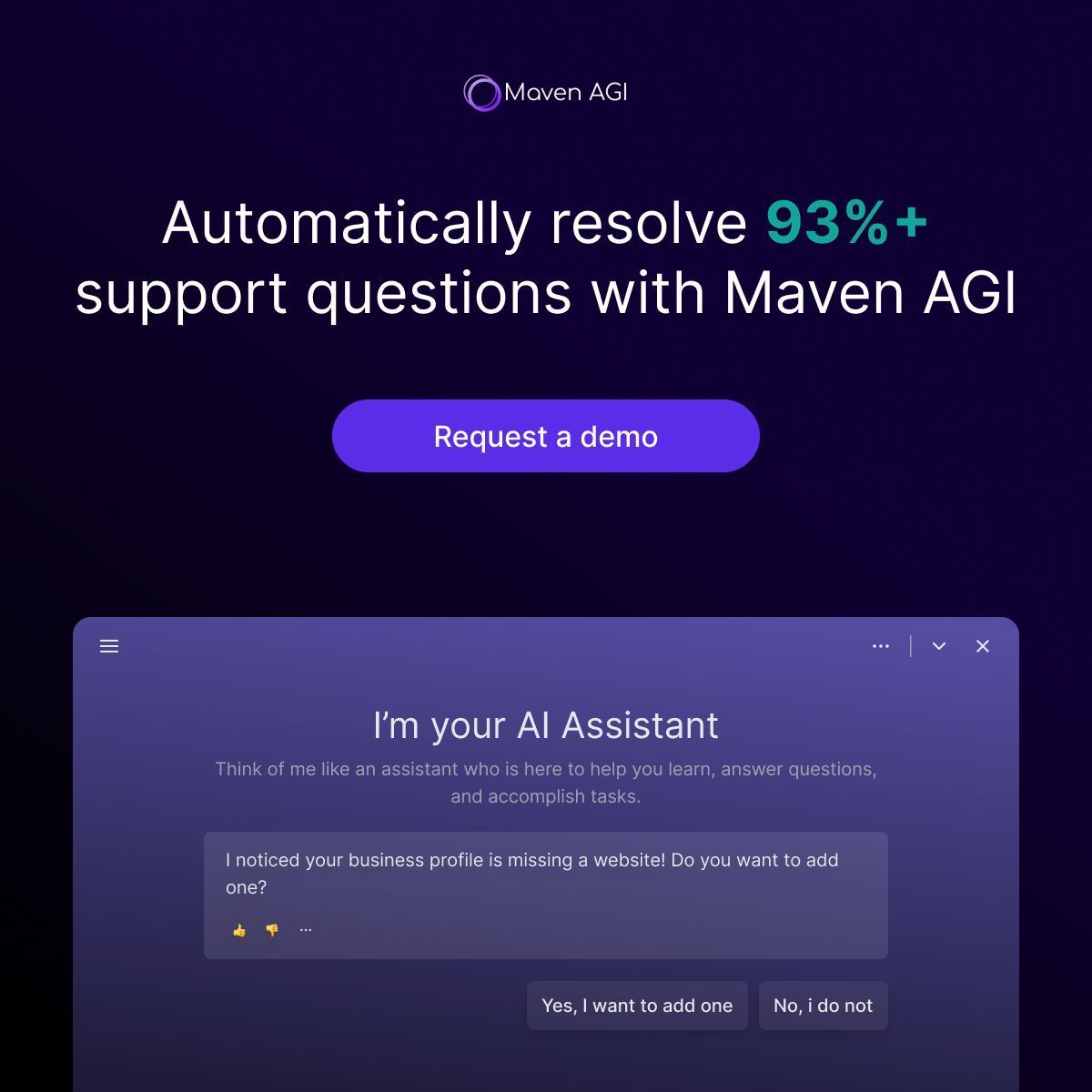- Solan Sync
- Posts
- [Best AI Agent? ]OpenAI Operator: Transforming Web Automation with AI
[Best AI Agent? ]OpenAI Operator: Transforming Web Automation with AI
OpenAI's Operator is an AI agent designed to perform web-based tasks, from research to e-commerce. Explore its groundbreaking capabilities and industry impact.
Writer RAG tool: build production-ready RAG apps in minutes
RAG in just a few lines of code? We’ve launched a predefined RAG tool on our developer platform, making it easy to bring your data into a Knowledge Graph and interact with it with AI. With a single API call, writer LLMs will intelligently call the RAG tool to chat with your data.
Integrated into Writer’s full-stack platform, it eliminates the need for complex vendor RAG setups, making it quick to build scalable, highly accurate AI workflows just by passing a graph ID of your data as a parameter to your RAG tool.
Drowning In Support Tickets? Maven AGI is here to help.
Maven AGI platform simplifies customer service by unifying systems, improving with every interaction, and automating up to 93% of responses. Seamlessly integrated with 50+ tools like Salesforce, Freshdesk, and Zendesk, Maven can deploy AI agents across multiple channels—text, email, web, voice, and apps—within days. Companies like Tripadvisor, ClickUp, and Rho slash response times by 60%, ensuring quicker support and exceptional customer satisfaction. Don’t let support tickets slow you down
OpenAI Operator: Transforming Web Automation with AI
OpenAI’s Operator is an AI agent designed to perform web-based tasks, from research to e-commerce. Explore its groundbreaking capabilities and industry impact.
OpenAI has officially launched Operator, its first AI agent capable of interacting with web browsers to perform tasks.
This breakthrough allows AI to impact the real world directly by automating web-based actions, sparking excitement and debate within the tech community.
Why Operator is a Game-Changer
For the first time, OpenAI agents can move beyond theoretical applications to deliver real-world utility.
By using browsers as tools, Operator unlocks a wide range of possibilities, from automated research to e-commerce management and beyond.
Here’s a look at the reactions and use cases making waves across the AI industry:
Industry Reactions to Operator
1. Greg Brockman: This is Just the Beginning
Greg Brockman, CTO of OpenAI, emphasizes that Operator is only the start of what’s possible. Future agents may extend their control to desktops, phones, and other platforms, making AI an indispensable part of our digital lives.
Operator — research preview of an agent that can use its own browser to perform tasks for you.
2025 is the year of agents.
— Greg Brockman (@gdb)
6:24 PM • Jan 23, 2025
2. Andrej Karpathy: Parallels to Humanoid Robots
Andrej Karpathy, OpenAI cofounder, draws a fascinating comparison between Operator and humanoid robots. While robots navigate the physical world, Operator adapts to human-designed digital systems like browsers and websites, making it a digital pioneer in human-centric environments.
Projects like OpenAI’s Operator are to the digital world as Humanoid robots are to the physical world. One general setting (monitor keyboard and mouse, or human body) that can in principle gradually perform arbitrarily general tasks, via an I/O interface originally designed for… x.com/i/web/status/1…
— Andrej Karpathy (@karpathy)
9:42 PM • Jan 23, 2025
3. Aaron Levie: Unlocking 100x More Use Cases
Aaron Levie, CEO of Box, highlights the transformative potential of browser-enabled agents. Since APIs are not available for many web-based tasks, Operator fills this gap, enabling businesses to automate tasks previously out of reach.
AI Agents having full browser access is going to open up 100x more use cases for AI. The web doesn’t have APIs for the long tail of tasks that we do every day on computers, and browser use is a major missing link. Another building block for AI is here.
— Aaron Levie (@levie)
8:18 PM • Jan 23, 2025
Open-Source Alternatives Emerge
The open-source community has wasted no time in responding to Operator’s release, presenting exciting new tools inspired by its functionality:
These tools reflect the growing interest in browser-powered agents and signal a competitive and collaborative future for AI-driven automation.
You don't need to pay $200 for AI.
We're launching Open Operator - an open source reference project that shows how easy it is to add web browsing capabilities to your existing AI tool.
It's early, slow, and might not work everywhere. But it's free and open source! 🔗👇
— Paul Klein IV (@pk_iv)
5:07 PM • Jan 24, 2025
Operator’s Unique Edge: Data and Memory
Greg Kamradt, President of @arcprize, highlights a critical advantage of Operator: procedural data collection. As Operator learns to navigate websites and perform tasks, it builds memory and becomes increasingly efficient. This capability not only improves individual agent performance but also gives OpenAI a competitive advantage in refining its technology over time.
Imagine the procedural memory OpenAI is building up about how to navigate every website operator touches
Once they jump out of the browser to the desktop, no app is safe.
— Greg Kamradt (@GregKamradt)
2:37 AM • Jan 24, 2025
Potential Use Cases for Operator
Operator’s ability to interact with browsers unlocks new possibilities for automation and productivity:
Online Research: Automating repetitive research tasks.
E-Commerce: Managing online stores, including inventory updates and price tracking.
Customer Support: Handling queries and navigating client portals.
Data Scraping: Extracting insights from unstructured web data.
By integrating into existing workflows, Operator can enhance efficiency and reduce human effort, making it a valuable tool for businesses and individuals alike.
Conclusion
OpenAI’s Operator marks a significant leap in the evolution of AI. Its ability to perform web-based tasks in real-time represents a paradigm shift in automation. With strong reactions from industry leaders and open-source innovators, Operator sets the stage for a new era of productivity and digital integration.


Reply